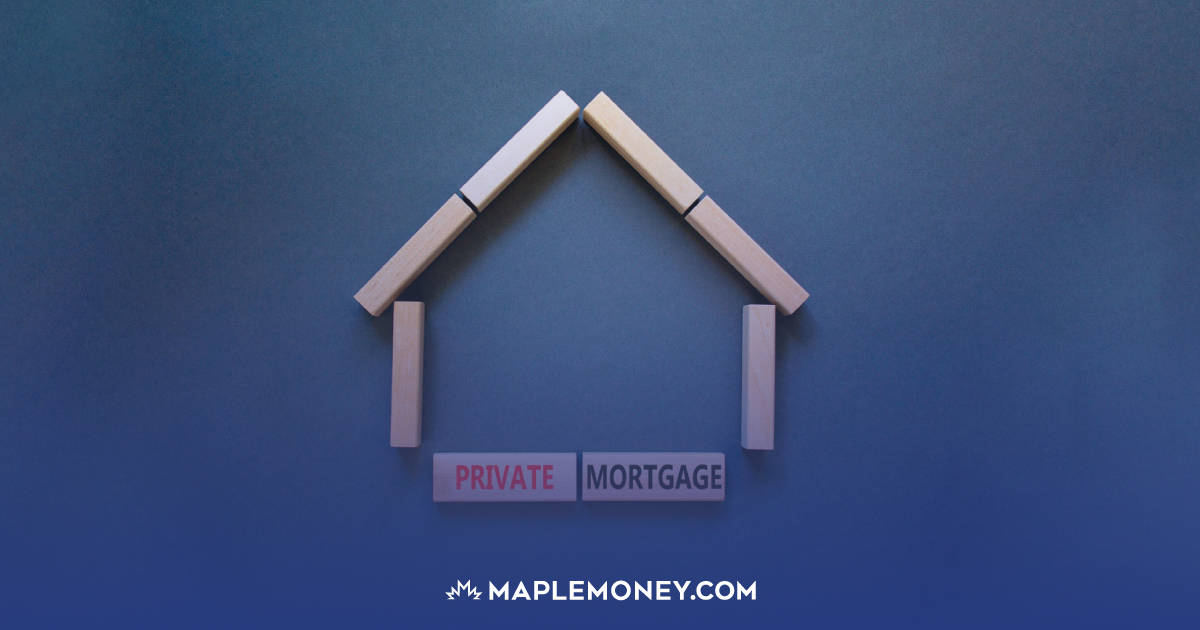Private Mortgage Lenders: How Private Mortgage Loans Work in Canada

For various reasons, not everyone can qualify for a mortgage through a conventional lender, such as a bank or credit union. Sometimes, the only option is to obtain financing through a private mortgage lender. But what is a private mortgage lender, and how do private mortgages work?
In this article, I’ll cover everything you need to know and explain when you might want to consider applying for a private mortgage.
What Is a Private Mortgage?
A private mortgage is an alternative form of mortgage financing private lenders offer. Most private mortgage loans are considered temporary, with terms ranging between six months and three years. Private mortgages are characterized by their high-interest rates and fees and less stringent approval requirements than mainstream mortgage lenders.
In many cases, borrowers who take out private mortgages have been unable to obtain financing through their bank or credit union. They may have also tried to qualify through a “B Lender” without success. (B mortgage lenders fall in the space between banks and private mortgage lenders). They have less stringent lending criteria than the banks, but not everyone can qualify through a B Lender.
Examples of B Lenders in Canada include MCAP, Home Trust, Equitable Bank, and First National. Private lenders include Trillium Mortgage, Sun Mortgage Corporation, Guardian Financing, and Prudent Financial. I’ll cover the private mortgage lenders in more detail below.
Who Should Consider a Private Mortgage Lender?
While you should consider private mortgage lenders a last resort for mortgage financing because of the high costs, they fill an essential role in the mortgage industry.
You see, to qualify for a mortgage with a bank or credit union, you must be able to meet their stringent lending criteria. This includes a good credit score for all borrowers, job stability, and proof of income. One of the reasons banks can offer the lowest mortgage rates is by only dealing with the strongest borrowers…strongest on paper, at least.
Many Canadians are perfectly capable of repaying a mortgage, but they don’t fit inside the small box of conventional lenders. They may have struggled with credit or are new to credit. They may be new to Canada or have non-standard income – self-employed, seasonal, part-time, etc.
Another advantage of private lenders is that they often approve and fund mortgages more quickly than regular lenders. If a borrower needs to move quickly, they may choose to go through a private lender temporarily before switching the mortgage to a conventional lender after their term expires.
Characteristics of Private Mortgage Lenders
Several characteristics differentiate private mortgages from those you would get from your bank. Here are some of the more common features:
Equity Lending
Private mortgage lenders don’t require you to have a good credit score or provide proof of income. Instead, they base their approval decisions on how much equity you have in your home and assess their risk based on that factor. Your home equity is the percentage of home value that you control.
For example, if your home is worth $300,000, and you want to refinance a total of $150,000, your loan-to-value is 50%, and your equity is also 50%. If you borrow $240,000, your loan-to-value climbs to 80%, and your equity is reduced to 20%.
The more equity you have, the less likely you are to default on your mortgage payments and risk the loss of your home.
Less Stringent Lending Criteria
Private mortgage lenders are much more lenient than banks regarding creditworthiness. Many don’t have a minimum credit score requirement, and some will lend to people who are entirely new to credit. Private lenders are willing to lend to self-employed individuals who often have fluctuating income that can’t be confirmed with a T4 slip or pay stub.
High-Interest Rates and Fees
Private mortgage interest rates are much higher than those from conventional lenders because of the additional risk they take by approving sub-prime borrowers. While their rates vary, private lenders have been known to charge rates well into the teens, almost as high as credit card interest rates. This is also why they are meant as a temporary solution. Most borrowers sign up with a private lender hoping to switch to a bank or credit union within 1-2 years.
Private Lenders Deal Through Mortgage Brokers
Most private mortgage lenders get their customers from mortgage brokers. While you can apply directly online, here’s how the process often works. You get declined for a mortgage from your bank or credit union. They refer you to a mortgage broker if you’re not already dealing with one.
Your mortgage broker shops your application around to various B Lenders, such as trust companies or dedicated mortgage B lenders. If they don’t approve your application, your mortgage broker will assess whether it makes sense to get a private mortgage.
If so, they will match you with a private lender willing to accept your application’s terms.
Private Mortgages Are Meant to be Temporary
No one wants to pay 10% or 15% interest on a mortgage, and private mortgage loan companies know this. They see their service as a temporary solution, so they only offer terms of up to 2 or 3 years. They expect you to work with your broker during that time so that you can eventually qualify for a mortgage with a conventional lender and pay out their private mortgage.
Private Mortgage Lenders vs. Banks
The characteristics of a private mortgage lender are very different from conventional lenders, e.g., banks, credit unions, and trust companies. Perhaps the easiest way to illustrate this is by listing the various attributes of each:
| Private mortgage Lenders | Conventional Mortgage Lenders |
|---|---|
| Approval based on home equity | Approval based on credit and income |
| Short-term loans only (6 months to 3 years) | Short and long-term loans |
| Highest interest rates | Lowest interest rates |
| Accept previous bankruptcy | No bankruptcy (exceptions may apply) |
| Fast approval and funding | Slower approval and funding |
| Often have high setup and maintenance fees | No setup fees (exceptions may apply) |
Who Should Consider a Private Mortgage?
There are many situations when a private mortgage is the best fit, and it isn’t always a matter of having bad credit. Here are some scenarios when you would consider a private lender.
- New to Canada (no credit history)
- poor credit (score below 600)
- Previous bankruptcy or consumer proposal
- self-employed, can’t confirm two years income history
- Insufficient home equity to qualify with a conventional lender
- Need approval fast to secure property (or quick possession)
- Bridge financing
Examples of Canadian Private Mortgage Lenders
Many private mortgage lenders are operating in Canada. Most are regional, meaning they cover a specific city or province rather than all of Canada. The best way to contact a private lender is to go through a mortgage broker, who will direct your application to the lender they feel is the best fit. Here is a list of Canadian private mortgage lenders.
Alpine Credits Ltd.
Having been around since 1969, Alpine Credits Ltd. considers itself one of Canada’s pioneers of private mortgage lending. They serve clients in Canada’s four most populous provinces, British Columbia, Alberta, Ontario, and Quebec.
If your bank has declined you, Alpine Credits can get you approved for a mortgage within 24 hours, with much less stringent borrowing criteria.
They offer 1st and 2nd mortgages and can sometimes provide 3rd mortgages on a case-by-case basis. Their mortgage loans cover everything from home renovations and debt consolidation to business startup and short-term financing needs.
According to Alpine Credits, approval is based on your home equity, not your credit score. In fact, applying through Alpine won’t impact your credit score.
Key Features
- Longstanding private mortgage lender serving four provinces
- Approval in as little as 24 hours
- Mortgage funding is possible within one week
- Approvals are based on equity, not on income or credit score
- Mortgage application won’t affect your credit
- Newcomers to Canada welcome to apply
Craigburn Capital
Craigburn Capital is a mortgage broker located in Nova Scotia, Toronto, and Vancouver. They specialize in private residential and commercial mortgages, and their target clients are those who conventional lenders have declined.
They base their approvals on your property rather than your credit score and income. Their typical loan terms are 12 to 24 months. Rates can start as low as 5%, but their fee can be as much as 10%. They will lend up to 80% of the value of your property, which is higher than many private lenders are willing to go.
Key Features
- Approval within 24 hours
- Approval based on equity rather than credit or income
- Terms between 12 and 24 months
- Interest rates as low as 5% (can be much higher)
- Will lend up to 80% loan-to-value (LTV)
Craigburn Capital states on its website that borrowers should have an exit plan in place when they apply for a private mortgage, given that their services are considered a short-term solution only.
Guardian Financing
Guardian Financing is a private mortgage lender serving clients in the Greater Montreal Area. Their goal is to help mortgage brokers obtain mortgage financing for their clients who conventional lenders are declining. They cover residential, multi-family, and commercial properties, with terms between 6 and 12 months. They can handle the following scenarios: home purchases and refinancing for renovations, liquidity, debt consolidation, 60-day notices, and bridge financing. Guardian will lend up to 75% of the property value, with monthly interest payments only.
Key Features
- Montreal-based private mortgage lender
- Terms of 6 to 12 months
- Purchases and refinances
- Residential, multi-family, and commercial properties
- Will lend up to 75% loan-to-value.
Private Lender Inc.
Private Lender Inc. is a Canada-wide private mortgage lender. Like many private lenders, they focus on a client’s equity rather than their credit or income. They welcome the following client profiles and situations: self-employed, good, bad, or no credit, bankruptcy, consumer proposal, collections, judgments, mortgage arrears, tax arrears, and more.
Key Features
- 1st and 2nd mortgages available (sometimes 3rd mortgages)
- Terms are 12 months, interest-only payments
- The prepayment penalty is three months of interest
- Minimum loan amount is $20,000
- Minimum property value is $75,000
- The online application can be completed within 3 minutes
- Approval can often be obtained within 24 hours
- Funding can occur within a few days in many cases
- Direct deposit to your account is available
Prudent Financial
Ontario-based Prudent Financial markets itself as an alternative to banks. The company offers both secured and unsecured home equity loans as well as car title and mortgage storage loans, allowing you to borrow against your vehicle’s equity.
As a private mortgage lender, Prudent offers 1st, 2nd, and 3rd mortgages. Because they are an equity lender, they don’t require proof of income. Prudent will consider applicants with previous consumer proposals or bankruptcy. When you you make payments to Prudent, they are reported to the credit bureau, which can help you build or rebuild your credit score.
Key Features
- Equity lender, no proof of income required
- Approval is as quick as 30 minutes
- Private mortgage financing up to $500,000 O.A.C.
- Bankruptcy and consumer proposal are accepted.
- Borrow against the equity of your home, car, or motorcycle.
- Serving customers in the province of Ontario
Sun Mortgage Corporation
Winnipeg-based Sun Mortgage Corporation operates as a fully licensed private mortgage lender, broker, and administrator in Manitoba and Saskatchewan. Sun Mortgages’ goal is to help their clients through short-term difficulties so they can refinance with a conventional lender within 12-24 months. With Sun Mortgage, borrowers must have a credit score, but no minimum score is required. They will consider financing to cover collections and judgments, foreclosures, and bankruptcy.
Key Features
- Approval is possible within 24-48 hours
- Maximum loan-to-value of 75%
- Amortizations up to 25 years
- Must have a credit score, but no minimum requirement
- Foreclosure and bankruptcy accepted
- Self-employed applications are welcome (the most recent NOA is required)
For more details, check out the Sun Mortgage website.
Trillium Mortgage
Trillium Mortgage has provided private mortgage financing to borrowers in Ontario since 1989. According to Trillium, 96% of their mortgages fall into the private financing category. They arrange mortgage financing for borrowers who banks, credit unions, and trust companies have declined. This includes people with poor credit, non-provable income, power of sale, credit proposal, etc.
Trillium will accept mortgage refinancing for the following purposes: Home improvement, debt consolidation, Power of sale, consumer proposal payout, mortgage arrears, property tax arrears, Canada Revenue Agency arrears, credit card, and auto loan arrears.
Key Features
- Private first mortgages to 80% loan-to-value (LTV)
- Private second mortgages to 90% LTV
- Private third mortgages to 85% LTV
- Home equity lines of credit (HELOCs) are available
Note that Trillium’s rates vary and are location-specific, so they are not listed on their website.
Pros and Cons of Private Mortgage Lenders
To summarize what we’ve covered, here is a list of the pros and cons of getting a mortgage through a private lender:
Pros
- Get a mortgage with bad credit
- Proof of income is often not required
- Fast approval and funding
- No minimum credit score requirement
- Applying doesn’t hurt your credit
- Will often accept higher loan-to-values
- May accept previous bankruptcy or consumer proposal
- Flexibility of 2nd and 3rd mortgages(in some cases)
Cons
- High-interest rates
- Must have some home equity
- Expensive setup or maintenance fees
- Only a short-term solution
Final Thoughts on Private Mortgages
Unfortunately, many Canadians who are declined for a mortgage are left in limbo, unsure of their options. Not every bank or credit union advisor will take the extra step of referring you to a mortgage broker who can help.
If that’s you, I recommend contacting a broker where you live and asking them for alternative solutions. Hopefully, you won’t have to apply for a private mortgage, but if it makes sense, it might work out well as a short-term solution.


